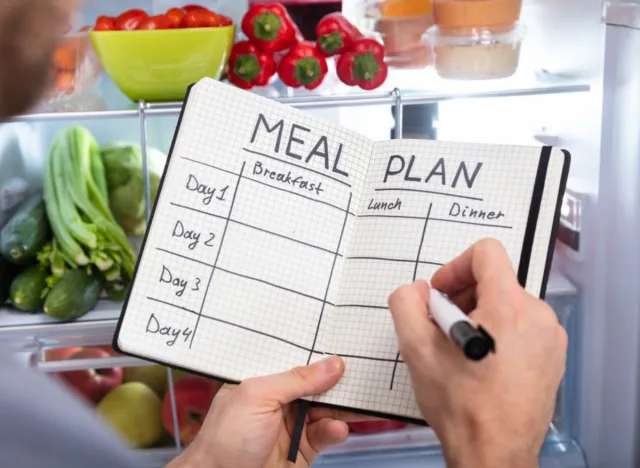Let’s be honest: Losing weight can be a grueling process. Sadly, you can’t just snap your fingers and watch the scale magically move down. It’s twice as frustrating when you’re working out and think you’re doing all the right things, but not losing weight. Sound familiar? We totally get it, which is why Eat This, Not That! spoke with the experts who share why this happens and what you can do to make the scale move in a favorable direction.
It’s important to be patient. Keep in mind there’s no overnight way to achieve fitness results. Sydney Yeomans, NASM CPT and director of fitness for BODY20, tells us, “While one might observe changes in the first month, attaining specific objectives often takes three to six months. Weight loss is influenced by various factors such as genetics, workout quality, and diet. Everyone’s body reacts differently, so recognizing what aligns best with your body can accelerate weight loss results.” So keep up the good work—you’ll get there!
If you’re working out and not losing weight, keep reading to learn why and how you can make improvements. And when you’re finished, be sure to check out How To Lose One Pound—Adding Up to Gradual Weight Loss That Lasts.
Working out and not losing weight? Here’s why.
When losing weight is your goal, it’s necessary to keep your eye on the prize. Our experts uncover some of the sneaky reasons you’re not achieving results and how you can switch up your routine to make progress.
1. You’re only focusing on weight loss or weight gain.

Don’t get too caught up in the number the scale’s showing you, but rather how your clothes are fitting. Keep in mind that building muscle won’t make the scale go down—and that’s not a bad thing.
Yeomans stresses, “It’s advisable not to focus solely on weight loss or weight gain. When one exercises correctly and maintains a healthy diet, weight fluctuations are natural. If your weight remains constant despite doing everything right, it might be because you’re building muscle. Since muscle is denser than fat, your weight might not change, but you’ll observe noticeable alterations in your physique. Consequently, it’s crucial to assess overall body composition, including body fat percentage and muscle mass, to better understand changes during your fitness journey.”
2. You’re not being consistent.
Losing weight has everything to do with consistency. It’s also a combination of what you eat and doing the right exercise routine.
Yeomans tells us, “Weight loss largely boils down to 80% diet and 20% exercise … Many struggle with weight loss primarily due to a lack of consistent effort. While many believe that occasional healthy meals and sporadic workouts will suffice, inconsistent habits will stymie results … Committing to just two 20-minute sessions per week can make a difference.”
3. Your diet’s not as efficient as it should be.
When it comes to weight loss, it’s essential to know everything you’re eating and drinking, along with how much you’re working out so you can create a calorie deficit each day. That being said, many individuals are not maintaining the proper diet, which can be a major roadblock.
“A misconception exists that eating once or twice a day combined with workouts will lead to weight loss. However, the human body doesn’t operate that way. If someone consistently exercises but under-eats, the body resorts to stored fats for energy,” Yeomans stresses. “It’s equally important not to overconsume. Exceeding daily caloric needs can also hinder weight loss efforts.”
4. You’re not getting enough sleep.

You’re likely wondering what sleep has to do with weight loss. It happens to be a major player! According to Tyler Read, the founder of PTPioneer.com and a personal trainer who’s been involved in the health and fitness world for the past 15 years, tells us, “Lack of sleep can affect hormones that regulate appetite and metabolism, making weight loss more challenging.”
The National Sleep Foundation recommends adults between the ages of 18 to 64 should get seven to nine hours of sleep each night. Adults who are 65 and up should aim for seven to eight hours of sleep. If you’re not hitting these recommendations, you should definitely look into why.
5. You’re not managing your stress levels.
Too much stress can negatively impact every aspect of your life—and yes, that includes your efforts to lose weight, even if you’re working out. According to Read, “Chronic stress can lead to elevated cortisol levels, which can promote fat storage, especially in the abdominal area.”
Here are some steps you can take to make weight loss easier.
1. Add strength training to your routine.

If you’re not lifting weights or doing bodyweight strength exercises in your weekly regimen, it’s important to do so. Remember: Muscle is your friend, not your foe, even when you’re trying to lose weight. “Building muscle can boost your resting metabolic rate, helping you burn more calories even when you’re not working out,” Read explains.
2. Stay hydrated.
You may be surprised to learn just how important drinking lots of water is for your weight loss journey. In addition, sometimes when you think you’re hungry, your body is actually just thirsty. “Drinking water can help with satiety and ensure you’re not mistaking thirst for hunger,” Read shares.
3. Keep a food journal.

Tracking everything that you eat will totally aid in your weight loss efforts. As a matter of fact, according to research, individuals who tracked their food in a journal lost double the amount of weight compared to those who didn’t use a food journal.
“Use apps or journals to keep a record of what you eat,” Read recommends. “This can help identify any excess caloric intake or dietary habits that might be hindering weight loss.”
4. Be patient.
Good things in life truly come to those who wait, and weight loss is no exception. “Weight loss is a gradual process,” says Read. “Instead of focusing solely on the scale, pay attention to other indicators of progress like improved strength, better endurance, clothes fitting differently, or enhanced overall well-being.”
5. Seek guidance from a professional.

You don’t have to walk this journey alone. When in doubt, it’s always a smart idea to seek the advice of a professional. “Consider working with a nutritionist, personal trainer, or healthcare provider to get personalized advice and recommendations,” Read suggests.

